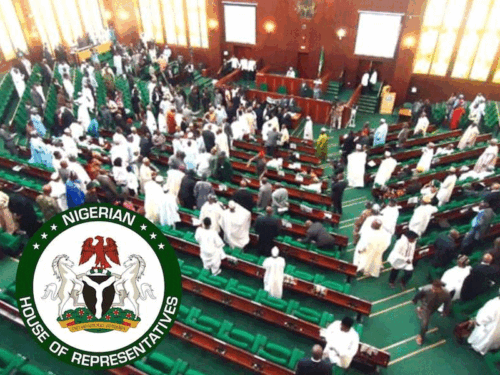The House of Representatives has resolved to investigate allegations of importation of substandard products and high-sulphur diesel into Nigeria.
The Green Chamber also resolved to probe resurgence of fuel queues and the return of petrol subsidy.
The resolution of the House was sequel to the adoption of a motion of urgent national importance moved at the plenary on Tuesday by Hon. Billy Osawaru and Hon. Phillip Agbese.
The House also resolved to probe unavailability of fuel stock for downstream domestic refineries, disruption of distribution of PMS products, unfair subsidisation of PMS and other petroleum products racketeering and favouritism in the Pro Forma Invoice System (PFI) regime.
Moving the motion, Osawaru said in recent times there had been a resurgence of fuel queues in petrol stations, with allegations of high cost of PMS and non availability of fuel stock for downstream domestic refineries in Nigeria and disruption of distribution of PMS products.
He said there was also an allegation of unfair subsidisation of PMS and other petroleum products which negatively affects competitiveness in the sector.
Osawaru added that there were also allegations of racketeering and favouritism in the Pro Forma Invoice System (PFI) regime, indiscriminate issuance of licenses and importation of refined petroleum products.
He noted that with the alleged return of PMS price intervention with its impact on the domestic market, there were also allegations of product unavailability to marketers from NNPC Retail.
The lawmaker said the endless shifting of timelines for refinery rehabilitation, the nefarious activities at petrol depots which have affected product distribution and caused scarcity.
Osawaru stressed that there was also the use of middlemen in trading and has negatively affected domestic crude supply.
He decried the indiscriminate issuance of licenses, unavailability of laboratories to check adulterated products and the influx of adulterated products into the country, allegation of non domestication of profits realised from crude marketing sales in local banks.
The lawmaker said: “Also disturbed about the allegation of the return of subsidy on downstream PMS products, unclarity about the exact landing cost of PMS, reduction in retail price and its impact on downstream operations, allegation of importation of substandard products and high-sulphur diesel into Nigeria, sale of petroleum products below fair market value and its impact on downstream and local refineries and as the source of funds for such interventions.
Osawaru expressed worry about the failure of the regulators such as NMDPRA and NUPRC to enforce compliance with standards that woulf help achieve the growth of downstream sector and the lack of support to local crude refiners, issuance of import license, despite local production.
The House resolved: “Mandate the House Committees on Petroleum Resources (Downstream) and (Midstream) to carryout a legislative forensic investigation into the resurgence of fuel queues in petrol Stations, allegations of high cost of PMS,
“Unavailability of fuel stock for downstream domestic refineries, disruption of distribution of PMS products, unfair subsidisation of PMS and other petroleum products racketeering and favouritism in the Pro Forma Invoice System (PFI) regime,
“Indiscriminate issuance of licenses and importation of refined petroleum products, alleged return of PMS price intervention, allegation of product unavailability to marketers from NNPC Retail, endless shifting of timelines for refinery rehabilitation, the nefarious activities at petrol depots;
“Also mandate the House Committees on Petroleum Resources (Downstream) and (Midstream) to carryout a legislative forensic investigation into the presence of middlemen in trading, indiscriminate issuance of licenses, unavailability of laboratories to check adulterated products, influx of adulterated products into the country:”
The House also resolved to probe, “the allegation of return of subsidy on downstream PMS products, unclarity about the exact landing cost of PMS, reduction in retail price and its impact on downstream operations.”

